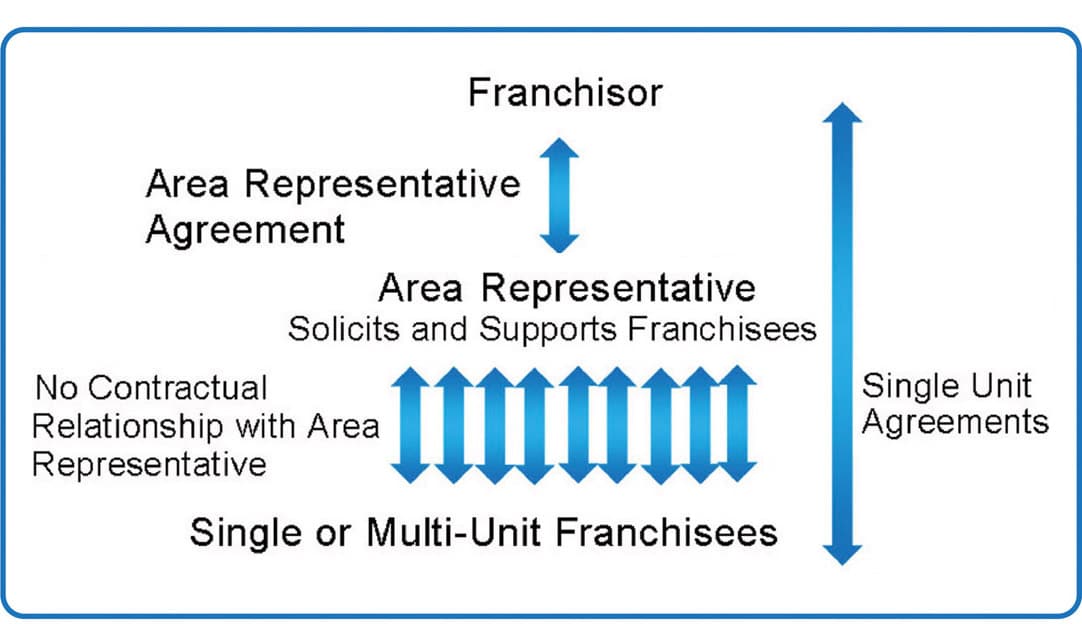In addition to the Franchise Agreement that each franchisee signs, a multi-unit developer enters into a multi-unit development agreement with the franchisor.
By Michael Seid, Managing Director, MSA Worldwide
While a franchisee may over time acquire multiple locations, an Area Developer (more properly called a Multi-Unit Developer) enters into the franchise relationship with a plan to develop multiple locations.
In addition to the Franchise Agreement that each franchisee signs, a multi-unit developer enters into a multi-unit development agreement with the franchisor that gives them the right and the obligation to develop:
- A set number of franchises; during
- A set period of time; in
- A defined market area.
For example, a multi-unit development may agree to open 5 locations over the next three years in Dade County, Florida. To obtain those rights the multi-unit franchisee will usually pay a development fee that is generally non-refundable and is frequently applied on a pro-rata basis to the unit franchise fee owed as each location’s franchise agreement is signed.
Assume that a franchisor’s initial franchise fee is $30,000 and they require a $15,000 deposit for each additional franchise the multi-unit franchisee agrees to open. Also assume that the multi-unit franchisee agrees to open 5 locations. Upon signing the multi-unit development agreement, the multi-unit developer will generally also sign their first franchise agreement and pay to the franchisor $90,000.00.
- Initial Franchise Fee: $30,000.00
- Development Fee (or Deposit) (4 x $15,000): $60,000.00
- Total Payment: $90,000.00
As each of the additional franchise agreements is signed, the multi-unit developer will pay to the franchisor $15,000.00.
- Initial Franchise Fee: $30,000.00
- Less: pro-rata portion of Development Fee: $15,000.00
- Total Payment: $15,000.00
The Advantages of Multi-Unit Development
There are significant advantages for franchisors and franchisees when they enter a multi-unit development agreement. Still, offering exclusively multi-unit development and not also offering single-unit opportunities is rarely the proper path for franchisors. Some of the advantages of multi-unit development are:
- Multi-Unit Developers benefit by locking in a market area that generally provides them with the right to be the exclusive franchisee during the term of the development agreement. Once the multi-unit developer has developed all of the franchises they agreed to develop in the agreement, or when the term of the development agreement expires, generally the market exclusivity returns to the terms included in each individual franchise agreement.
- The Multi-Unit Developer also generally does not pay the same initial franchise fee as the single unit franchisee. In the example above it was shown that the same franchisee fee is paid for each location, but in the real world, while the developer would pay the same initial fee for its first location, in tiers, the franchise fee for subsequent locations would be reduced. For example, the initial fee for franchises 2 through 5 might be reduced to $25,000 and the locations above 5 might be reduced again to $20,000.00. In some development agreements, subject to the franchisor’s approval, the developer may be allowed to open additional franchises during the term, after they have met their initial development obligations at even a lower initial franchise fee.
- An additional benefit that some franchisors provide to multi-unit developers may include a reduced royalty once a developer has opened a certain number of locations. This lowering of fees makes sense as the cost of supporting a multi-unit franchisee is generally lower on a per-unit basis, the multi-unit developer has a different cost structure than a single unit franchisee, and they generally have a back-of-house infrastructure that the franchisor can leverage to reduce its support costs. This includes providing the multi-unit developer with support, training, and tools in a way different than that provided to single unit franchisees designed for their different organizational structure.
For franchisors, they are able to have a better handle on market development because of the contractual obligations of the multi-unit developer. This allows them to better plan market support, advertising, supply chain, etc. Also, multi-unit developers are generally more sophisticated and better financed than single-unit operators, enabling franchisors opportunities not as easily available from single-unit franchisees. It is for this reason that today more than 50% of franchised locations are owned by franchisees that own more than one location.
Of course, the greatest risk to a franchisor entering into multi-unit development agreements is the selection of the wrong developer. In addition to taking a market off the table for a period of time for other development, and the risk that the developer will not meet their development timeline, you have additional problems if the developer does not operate their multiple locations to brand standards. With today’s vetting protocols, this risk is minor and manageable; also, properly constructed development agreements include specific dates for each unit’s development and cross-default provisions meant to protect the franchisor.
Classes of Multi-Unit Developers
A mistake often made by franchisors in marketing their franchise opportunity is to assume that their offering will be active to both single-unit franchisees and multi-unit developers. If they modify their offering, it generally only is a reduction in the initial franchise fee.
Another mistake is that they assume all classes of multi-unit franchisees are looking at their opportunity for the same reason. Proper multi-unit franchise offerings are developed in a way that is attractive to multi-unit developers in general, and also understand that strategic franchisees, private equity franchisees, and franchisees that are simply looking to operate multiple locations are different and have differing needs and reasons for considering entering into the relationship. The offering and the marketing of the offering, therefore, should be intelligently developed to maximize the opportunity to be attractive to each class of multi-unit developer.
Do you have questions about franchising your business?
MSA Worldwide provides expert guidance on building a successful and sustainable franchise business. Contact us today for a complimentary consultation.




